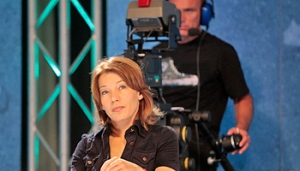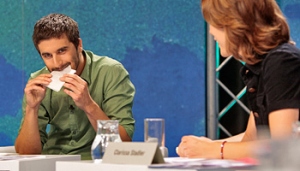 Philipp Weiss (Bild: ORF/Johannes Puch)
Philipp Weiss (Bild: ORF/Johannes Puch)
Weiss devoured his text
‘Blätterliebe’ – the text by Austrian Philipp Weiss highlights the ‘moments of love’ as he writes, creates and destroys. The author demonstrated his ‘Blätterliebe’ (love of pages) - and ate the text - coram publico.
‘A rather exhausting reading’
The 27-year old Viennese author is the youngest this year. After his ‘surely rather exhausting reading’ (Clarissa Stadler), the criticisms began. At this point, however, nobody, apart from the author, could have guessed just how ‘exhausting’ it was still going to be.
 IPB_Clarissa Stadler (Bild: ORF/Puch)
IPB_Clarissa Stadler (Bild: ORF/Puch)
Sulzer felt ‘entertained’
Alain Claude Sulzer noted that he had heard the text for the third time now and ‘greatly enjoyed’ it each time. ‘To me, the whole thing appears like an enthusiastic treading of water, the cat biting its own tail’. He was ‘entertained’ even though he did not ‘quite understand the ending’.
Text demonstrated dexterity but was irritating
‘Creation and destruction join forces in this text’, says Ijoma Mangold: ‘This is a typical story about the creative block of a writer. While word and sign, flesh and love function as pairs of opposites, on the inside of the text - just as in the stomach of the protagonist - there is only ‘paper’: a complicated process depicted very dexterously in the text: at the same time it irritated her because the mechanism of the final ending of the story could be seen coming ‘from about page four’.
Karin Fleischanderl set about defending it : the text, she believes, illustrates the state of postmodern literature – namely that everything is already written - in a new way. The symbol of ‘paper in the stomach’ is new to her. The underlying principle of ‘repetition’, the juror emphasised, is sign of an artificial language.
 IBP_Philipp Weiss (Bild: ORF/Johannes Puch)
IBP_Philipp Weiss (Bild: ORF/Johannes Puch)
A text for listening to, not for reading
Hildegard Elisabeth Keller’s experience was ‘similar to that of Ijoma Mangold’. When she read the text, it irritated her, when it was read out, however, she liked it very much. ‘This is a very sneaky fairy tale of the Bachmann prize itself’: 33-year old Oskar keeps producing text, then there is an endoscopy and he is being ‘x-rayed’. This allegoresis is a very interesting aspect of this text. One should also mention the ‘magical act of the absorption’ through eating the paper, which the medievalist pointed out specifically. For her, an ‘ancient magical tradition’, says Keller.
Jandl irritated by ‘forced originality’
‘There is nothing more irritating than humour that you don’t share’, was Paul Jandl’s criticism. He was irritated by this ‘forced originality’, these ‘redundancies’. ‘The text wants to be cleverer and more original that it has the capacity to be’, was Jandl’s judgement.
Feßmann declared the text ‘charming and humorous’
The text is not a parody, she believes, but rather draws attention to the work of the author as he writes. ‘As this happens, text is produced. Along the lines of: and here are another three lines’. She did however like the slapstick hospital scenes very much. What she perceived as negative when she read the text, as too much ‘wordiness’, worked well when the text was read out.
 IBP_Burkhard Spinnen (Bild: ORF/Puch)
IBP_Burkhard Spinnen (Bild: ORF/Puch)
A variation, not an etude
Burkhard Spinnen then said in Feßmann’s direction: the text confronts you with the appearance of literature as ‘text read out’ – an important subject. In the text, the writings of the protagonist lead to a ‘life disability’. It is a variation on a theme, not an etude, Spinnen believes. Here, just as in the previous text, a well-known theme is taken up, but here it goes beyond its mere fulfilment: an ‘abdominal birth’.
translated by expectTranslations